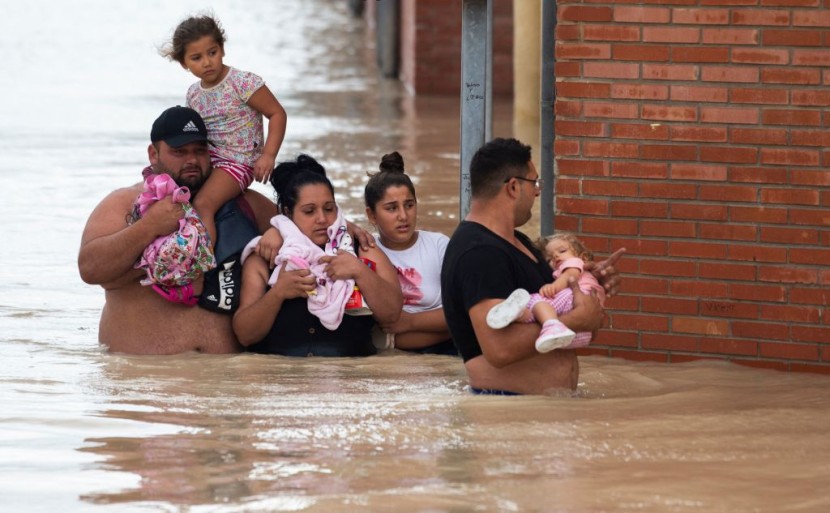
Spain is dealing with a relentless deluge of rain that has caused catastrophic flooding in several regions of the nation.
As the precipitation reaches exceptional levels, the mayor of Madrid has urged residents to remain indoors.
Spain Grapples with Unprecedented Rainfall and Catastrophic Flooding
The devastation caused by these torrential downpours has been extensive, with firefighters responding to an astounding 190 requests for assistance clearing Madrid's flooded roads. Due to the persistent rain, a highly anticipated football match between Atletico Madrid and Sevilla had to be postponed, highlighting the gravity of the situation.
While Cádiz, Tarragona, and Castelló have borne the brunt of the rainfall along the eastern coast of Spain, the country's capital, Madrid, in the country's center, has not been spared from the inundation. Residents in the northern region of Tarragona have been warned only to venture outside if absolutely essential.
Alcanar, also in Tarragona, experienced an astonishing 215 liters of rain per square meter within a mere 24-hour period-a staggering volume by any measure. As the saturated ground absorbs moisture, the increased risk of mudslides is one of the most significant concerns accompanying heavy rainfall.
This has caused difficulties for drivers, as vehicles have become stranded on flooded roads. There are reports that residential areas have also been gravely damaged by flooding. A resident of Alcanar described waking up to water flooding his residence on the second floor.
Several train services have been suspended due to these conditions, and people are strongly discouraged from traveling. Communities are collaborating to clear mud and debris from the paths between their residences to mitigate the disaster's effects.
This destructive weather pattern can be traced back to a slow-moving storm system that recently moved across Spain. This phenomenon, known in Spain as "depresión aislada en niveles altos" or Dana, typically occurs in the fall when cold air collides with mild sea winds.
Spain had experienced an unusually scorching summer, resulting in a significant amount of soil dehydration. This condition has substantially increased the likelihood of flooding by reducing the land's capacity to absorb rainwater.
Even though scientists cannot conclusively attribute this flooding to climate change, extreme weather events such as high temperatures and heavy rainfall are consistent with climate change trends, as weather patterns become more erratic and severe.
Tragic Loss of Lives in Central Spain as Storm Ravages Toledo Province
Two tragic deaths have been attributed to the tempest in the central province of Toledo. Emiliano Garca-Page, the leader of the regional administration of Castilla-La Mancha, has confirmed these casualties, though specific details have not been disclosed.
In one incident, a man died during a rescue operation on a road near the town of Bargas, and in another, a man killed as rescuers attempted to reach him in Casarrubios del Monte. Also in the province of Toledo, a male in his fifties was discovered dead near a river in the town of Camarena.
The search for a person whose vehicle was carried away by a swollen river in the rural community of Aldea del Fresno, west of Madrid, continues. Surprisingly, his 10-year-old son was discovered poised atop a tree, having endured a terrifying night there after his vehicle was submerged in floodwaters.
When the storm attacked, the family from the Madrid suburb of Alcorcón sought refuge in their vacation home in Aldea del Fresno, where the tragedy unfolded. Due to their fear of the sudden flooding, they ventured onto the road, resulting in a disastrous outcome.
Several bridges in Aldea del Fresno have collapsed due to the storm, and cascades of water have swept away numerous vehicles. Local emergency services are also engaged in the search for an 83-year-old man who was carried away by floodwaters in the neighboring town of Villamanta, as well as a missing woman in the town of Valmojado in Toledo.
Faced with this unprecedented weather crisis, Spanish authorities have taken extraordinary measures, including sending emergency alerts to residents via mobile phones in Spanish and English and employing loud alarms to encourage people not to use their vehicles and to stay inside.
This was the first time such a mobile phone alert system was utilized, highlighting the gravity of the situation. In addition, several theaters shut down early on Sunday, and the heavy overnight rainfall disrupted Madrid's public transportation services, including the metro.
Even though there were intermittent closures, the majority of metro lines resumed service by mid-afternoon. The Sunday-closed high-speed rail links between Madrid and the regions of Andalusia and Valencia on the east coast of Spain reopened on Monday, albeit with reduced speeds in some sections to assure safety.
After Sunday's extraordinary conditions, the alert level for the Madrid region was downgraded from maximum red to yellow on Monday morning, but the area remains on alert.
As Spain deals with the aftermath of this devastating storm, communities gather together to help each other clear debris while the nation mourns the tragic loss of life brought on by the catastrophic weather event.
Related Article: At Least 1 Dead, 70K Stranded During Burning Man Festival in Nevada








